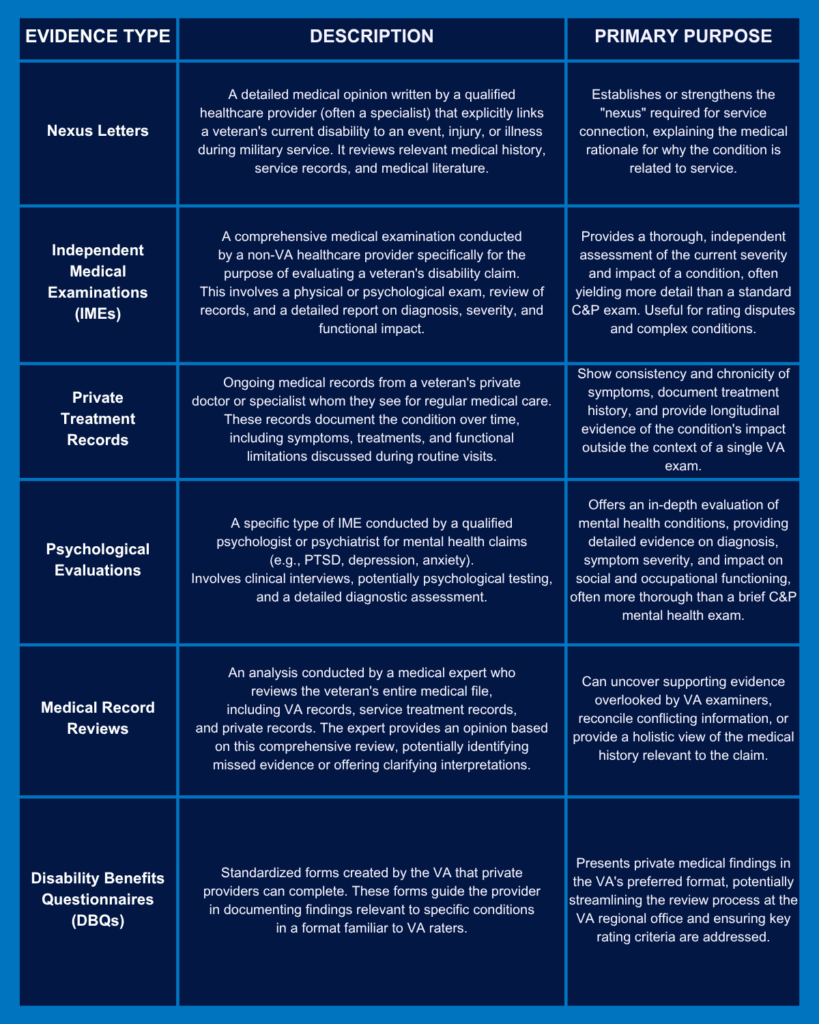Veterans seeking disability benefits earned through service often face a complex process. Relying only on VA doctors for the medical evidence needed for their disability claims might be shortchanging themselves and could hinder their path to obtaining VA benefits. While VA doctors and the broader VA health care system play a necessary role in the VA claims process, they are not always the most advantageous source for building a robust case for disability compensation.
Many disabled veterans do not realize that securing opinions and evaluations from a private doctor or independent medical professionals can significantly impact the success of their VA disability claim. The standard VA approach involves Compensation & Pension (C&P) exams conducted by a VA examiner or a contracted provider, forming a core part of the evidence considered. However, these exams frequently have limitations that can disadvantage the veteran.
Often, C&P exams are brief, potentially feeling rushed, and might not fully capture the extent or impact of a veteran’s health condition on their daily life. They serve a specific administrative purpose for the Department of Veterans Affairs, which differs from the purpose of ongoing medical treatment from your regular healthcare provider. Understanding why supplementing VA medical evidence is crucial can make a substantial difference in achieving the correct disability rating and receiving the veterans benefits you deserve.
The Limitations of VA Doctors in Disability Claims
VA doctors, including C&P examiners, operate under specific constraints within the VA healthcare system that can affect the depth and focus of the medical evidence they generate for disability claims. A primary role for many VA doctors is providing medical care and medical treatment, which is different from evaluating the specific legal requirements for service connection. When they perform C&P exams, their role shifts to that of an evaluator for the VA, not necessarily an advocate for the veteran.
This potential conflict and the inherent limitations of the examination process mean the resulting exam report might not fully support the veteran’s claim, even if the VA doctor is well-intentioned. Recognizing these limitations helps veterans understand why seeking additional evidence from outside the VA medical system is often beneficial. It’s about ensuring all relevant information about your service-connected disabilities is properly documented.

Time Constraints
Doctors within the VA health system frequently manage heavy patient loads, leading to tightly scheduled appointments. A typical C&P exam or even a standard appointment at a VA clinic or VA hospital might only last 15 to 30 minutes. This limited time is often insufficient to perform a deep dive into complex medical history, thoroughly assess chronic conditions, or understand the full impact of disabilities on a veteran’s life.
Conditions like PTSD, Traumatic Brain Injury (TBI), or chronic pain syndromes require detailed discussion and observation, which is difficult in a brief encounter. The pressure to stay on schedule can mean that nuances are missed, and the veteran may not have adequate opportunity to explain their symptoms or limitations. This brevity can directly impact the quality and completeness of the medical evidence entered into the claims file.
Limited Focus
Compensation & Pension exams are specifically structured by Veterans Affairs to gather information needed to adjudicate a VA claim. The VA examiner is given specific questions based on the disability claim submitted, often using a Disability Benefits Questionnaire (DBQ) or a similar va form. Their goal is to answer only those questions posed by the VA regional office handling the claim.
These exams are not intended to provide a comprehensive medical evaluation, establish a patient-doctor relationship, or offer medical treatment advice. Because of this narrow administrative focus, the C&P exam might overlook related health issues (secondary conditions) or fail to capture the full functional impact of the primary condition isn’t severe according to their narrow checklist. The examiner typically does not review all prior medical records or delve into aspects not directly asked on the form.
Strict Guidelines
VA doctors and C&P examiners must adhere to specific regulations and guidelines dictated by the VA claims process. These internal rules dictate how exams are conducted, what information is prioritized, and how the final exam report is written. While meant to ensure consistency, these guidelines can sometimes restrict the examiner’s ability to include all pertinent details or provide a nuanced medical opinion.
For instance, the guidelines might emphasize objective findings (like range of motion measurements or lab results) over subjective reports of pain or functional limitations, even though these subjective elements are critical for understanding the true severity. If a veteran’s symptoms arenât easily quantifiable or don’t fit neatly into the VA’s evaluation boxes, the resulting report might downplay the condition’s impact. Examiners might also be hesitant to strongly contradict previous VA findings or offer opinions outside the direct scope of the exam questions, potentially weakening the medical evidence.
Common Issues Veterans Face with VA-Only Evidence
When a veteran relies solely on the medical evidence generated through VA channels, particularly C&P exams, several recurring problems can arise during the processing of their disability claim. These issues can lead to frustration, delays, and ultimately, outcomes that don’t accurately reflect the veteran’s level of disability. Understanding these potential pitfalls highlights the value of seeking independent medical assessments.
These problems often stem from the inherent limitations discussed earlier – time constraints, narrow focus, and strict guidelines – but manifest in tangible ways within the veteran’s claims file. From incomplete documentation to outright claim denials, the consequences can significantly affect a disabled veteran’s access to earned disability benefits. Addressing these issues proactively with additional evidence is key.
Incomplete Medical Records
The brevity of many VA appointments and C&P exams often leads to medical records that lack sufficient detail. Notes might be cursory, focusing only on the specific issue addressed during that short visit or exam, rather than the veteran’s overall health picture or the chronicity and progression of their symptoms. Important details about flare-ups, limitations in daily life, or the failure of certain treatments might not be documented.
This lack of comprehensive documentation can make it difficult for the VA Rater at the regional office to grasp the full severity or chronic nature of a condition. If the medical history appears sparse or lacks detailed descriptions of functional impairment, the assigned disability rating might be lower than warranted. Gaps in records can be particularly problematic for conditions that fluctuate in severity.
Misunderstood Symptoms
Certain conditions, especially mental health disorders like PTSD or anxiety, and neurological conditions like TBI, involve complex symptoms that are not always easily observed or articulated in a brief exam setting. A VA examiner, possibly unfamiliar with the veteran’s full history, might misinterpret or underestimate the severity of these symptoms based on a short interaction where the veteran may be nervous or have difficulty communicating.
Subjective symptoms like pain, fatigue, anxiety, or cognitive difficulties are critical to many disability claims but can be minimized if the C&P exam focuses heavily on objective signs. When symptoms aren’t fully understood or documented accurately, the resulting medical opinion might not adequately support the veteran’s claim for service connection or an increased rating. This is a common area where an independent evaluation can provide crucial clarification.
Underrated Conditions
A significant consequence of incomplete or narrowly focused VA evidence is the potential for a condition to be underrated. The VA uses a rating schedule to assign a percentage evaluation based on the severity of service-connected disabilities, which determines the level of disability compensation. If the C&P exam report doesn’t fully capture the frequency, duration, or intensity of symptoms and their impact on earning capacity, the assigned rating may be too low.
This often happens when the condition isn’t severe during the brief C&P exam, or when the report emphasizes objective findings while downplaying functional limitations. For example, a veteran with severe back pain might have acceptable range of motion on exam day but experiences debilitating pain with prolonged standing or lifting, impacting work. If this functional impact isn’t well-documented, the VA might assign a lower disability rating based solely on the objective measurements, failing to achieve total disability status when appropriate.
Denied Claims
In some instances, reliance solely on VA-generated evidence can lead to the VA claim being denied altogether. This most often occurs when the C&P exam fails to establish a clear link, or “nexus,” between the veteran’s current condition and their military service (service connection). The examiner might state that the condition is less likely than not related to service, or that there isn’t enough evidence to make a determination.
Denials can also happen if the C&P exam concludes the condition isn’t severe enough to meet the minimum criteria for a compensable rating, even if the veteran experiences significant limitations. Without compelling contradictory evidence from an independent source, the VA rater is likely to rely heavily on the C&P examiner’s opinion. Overcoming claims denied requires strong, persuasive evidence, often necessitating independent medical opinions, especially during the appeals process or disability appeals process.

Why Independent Medical Evidence Matters
Securing medical evidence from sources outside the VA system, often referred to as independent medical evidence or private medical evidence, can be a game-changer for a veteran’s disability claim. This type of evidence comes from a private doctor, specialist, or other qualified healthcare provider who is not directly employed by the VA for the purpose of C&P exams. Its value lies in its potential to provide a more thorough, nuanced, and veteran-focused perspective on the disability.
Unlike VA C&P exams, which serve an administrative function for the VA, independent evaluations are typically centered on the veteran’s health and well-being. This different focus often results in more detailed and supportive documentation. Integrating this additional evidence into the claims file can significantly strengthen the case presented to the VA regional office.
Comprehensive Evaluations
One of the primary advantages of seeking an independent medical opinion is the opportunity for a more comprehensive evaluation. Private healthcare providers, especially those specializing in disability evaluations, can often dedicate significantly more time to examining the veteran, reviewing their entire medical history (including service records), and discussing symptoms in detail. They aren’t usually constrained by the 15-20 minute appointment slots common in some VA settings.
This allows for a deeper exploration of the condition’s onset, progression, severity, and its true impact on the veteran’s daily life and ability to work. Independent examiners can conduct more extensive testing if needed and can document subtle nuances or related conditions that might be missed in a brief C&P exam. This thoroughness leads to richer, more detailed medical evidence.
Focused on the Veteran’s Needs
A private doctor or independent medical examiner typically has a primary duty to their patient – the veteran. While they must provide objective assessments, their evaluation is generally geared towards understanding the veteran’s health status and the full extent of their limitations, rather than solely answering the VA’s specific administrative questions. This patient-centered approach can result in evidence that better reflects the veteran’s reality.
Furthermore, independent medical professionals are not bound by the internal guidelines or potential institutional pressures that might influence a VA examiner. They have more freedom to provide detailed explanations, cite relevant medical literature, and offer strong opinions on causation (nexus) and severity, based purely on their medical judgment and the evidence reviewed. This focus benefits the veteran seeking fair evaluation for their va benefits claim.
Specialized Expertise
Veterans can actively seek out independent medical professionals who possess specific expertise highly relevant to their claimed conditions. For instance, a veteran claiming PTSD can consult with a psychiatrist specializing in trauma; someone with a complex orthopedic injury can see a specialized surgeon; a veteran exposed to Agent Orange with resulting illnesses can consult an expert in toxic exposure effects. Finding an experienced VA knowledgeable provider can be helpful.
This specialized knowledge often exceeds the general medical background of a typical C&P examiner. An expert can provide a more authoritative and detailed medical opinion, referencing specific diagnostic criteria, medical research, and long-term prognoses related to the condition. Such specialized reports carry significant weight with VA raters trying to understand complex medical issues and are vital for certain service-connected disabilities.

Objective Perspective
While it might seem counterintuitive, an independent medical opinion is often viewed by the VA as providing a valuable objective perspective, particularly if it comes from a well-respected specialist. Because the provider isn’t part of the VA system evaluating the claim, their findings can be seen as less potentially biased than a C&P exam conducted “in-house.” This is especially true if the independent report is thorough, well-reasoned, and based on a comprehensive review of evidence.
A strong independent medical opinion that clearly outlines the diagnosis, the nexus to service, and the severity of impairment provides the VA rater with crucial information to consider alongside the C&P exam report. It offers a different viewpoint that can corroborate the veteran’s reported symptoms and functional limitations. This added perspective strengthens the overall body of evidence considered for the disability claim.
Types of Independent Medical Evidence
Veterans can leverage several types of independent medical evidence to bolster their VA disability claims. Each serves a slightly different purpose but contributes to painting a fuller picture of the veteran’s health condition and its connection to military service. Gathering the right types of evidence is crucial for addressing potential weaknesses in the VA’s own documentation.
Common forms include detailed opinion letters (Nexus Letters), comprehensive physical or psychological exams (IMEs), and expert reviews of existing records. These documents, prepared by qualified healthcare providers outside the C&P exam system, can provide the specific details and medical rationale needed to support claims for service connection, increased ratings, or secondary conditions. Understanding these options helps veterans strategically build their case.
Here’s a breakdown of key types:

Additionally, while not strictly medical evidence, statements from family members, friends, or former service colleagues (lay statements or buddy letters) can corroborate the reported symptoms and their impact on the veteran’s daily life. These can supplement the medical evidence considered by the VA.
How to Get Independent Medical Evidence
Obtaining valuable independent medical evidence requires proactive steps from the veteran. It’s not always automatically included in the claims file unless the veteran seeks it out and submits it as additional evidence. There are several avenues veterans can explore to connect with healthcare providers willing and able to provide these crucial evaluations or opinions.
Choosing the right approach depends on the veteran’s specific circumstances, the nature of their disability claim, and the resources available to them. Some options involve leveraging existing healthcare relationships, while others involve seeking out specialized services. Awareness of these pathways empowers veterans to take control of strengthening their VA disability claim.
Private Healthcare Providers
A veteran’s regular private doctor or specialist, often seen through private insurance or potentially via VA community care programs, can be a valuable source of evidence. These providers typically have an established relationship with the veteran and possess a longitudinal understanding of their medical history and conditions. Veterans can discuss their VA disability claim with their provider and ask if they are willing to write a nexus letter, complete a DBQ, or provide copies of relevant treatment records.
It’s helpful to provide the doctor with specific information about what is needed, such as clarifying the concept of “nexus” or providing the correct VA form (DBQ). Some doctors may be hesitant due to time constraints or unfamiliarity with the VA claims process, so clear communication is important. Emphasize that their detailed medical opinion on diagnosis, severity, and causation is what’s needed for obtaining VA benefits.
Specialized Disability Claim Services
Numerous private companies and medical groups specialize specifically in assisting veterans with obtaining medical evidence for their VA claims. These organizations often employ or contract with doctors, psychologists, and other medical experts who have significant experience with the VA disability system. They understand the terminology (like service connection, secondary conditions) and the type of detail VA raters look for in medical evidence.
These services typically offer IMEs, Nexus Letter writing, and medical record reviews for a fee. While this represents an out-of-pocket expense, the resulting evidence is often high-quality and directly tailored to address the requirements of the VA claims process. Veterans should research these services carefully, checking credentials and reviews, to find reputable providers.
Veterans Service Organizations (VSOs)
Accredited Veterans Service Organizations (VSOs) like the VFW, American Legion, DAV (Disabled American Veterans), and others offer free assistance to veterans navigating the VA claims process. While VSOs don’t directly provide medical evaluations, experienced VSO representatives are often knowledgeable about the importance of independent evidence. They may be able to offer guidance on what type of evidence is needed for a specific claim.
Furthermore, some VSO representatives might have local knowledge or contacts and could potentially suggest doctors or clinics in the area known to be helpful to veterans with their disability claims. They can also assist veterans in properly submitting the independent medical evidence obtained to the VA regional office handling their case. Utilizing VSO resources can be a valuable, cost-free first step.

VA-Accredited Attorneys and Agents
Veterans working with VA-accredited attorneys or claims agents, particularly during the appeals process, often gain access to networks of independent medical experts. These legal representatives understand that strong medical evidence is crucial for winning complex claims or appeals. They frequently collaborate with specific doctors and psychologists who specialize in providing IMEs and Nexus Letters for VA cases.
While legal representation involves fees (often contingent on winning back pay), their expertise in developing the claim can be invaluable. They guide the veteran on exactly what medical evidence is needed and facilitate obtaining it from qualified professionals. This is often a key strategy when claims denied need to be appealed or when seeking a higher disability rating.
The Impact of Independent Evidence on Claims
Introducing well-developed independent medical evidence into a VA disability claim can profoundly influence the outcome. It moves beyond relying solely on the findings of potentially brief C&P exams and provides the VA rater with a more complete and often more compelling picture of the veteran’s condition. The positive effects can be seen in approval rates, rating accuracy, and sometimes even the speed of the decision process.
For veterans facing challenges with their initial application or navigating the disability appeals process, strong independent evidence often becomes the cornerstone of a successful strategy. It directly addresses potential shortcomings in the VA’s own evidence gathering. Ultimately, it helps ensure the final decision accurately reflects the true extent of the veteran’s service-connected disabilities.
Higher Success Rates
Claims supplemented with robust independent medical evidence, such as detailed Nexus Letters or comprehensive IMEs, generally have a higher likelihood of approval for service connection. This evidence can effectively bridge gaps left by service records or inconclusive C&P exams, providing the clear link (nexus) between the disability and military service that the VA requires.
When a qualified expert provides a well-reasoned medical opinion stating the condition is “at least as likely as not” related to service, citing supporting evidence, it gives the VA rater a strong basis for granting the claim. This is particularly vital for conditions with delayed onset, those not documented clearly in service, or claims involving exposures like Agent Orange. Independent evidence directly counters negative opinions from C&P exams that might otherwise lead to claims denied.
More Accurate Ratings
Beyond just getting service connection approved, independent evidence is critical for ensuring the assigned disability rating accurately reflects the condition’s severity and its impact on the veteran’s life and earning potential. A thorough IME can document functional limitations, pain levels, frequency of flare-ups, and medication side effects in much greater detail than a standard C&P exam might capture.
This detailed information helps the VA rater assign a percentage evaluation that truly corresponds to the level of impairment. Veterans who feel their condition isn’t severe according to the VA’s initial assessment can use independent evaluations to demonstrate the full extent of their disability. This can lead to increased ratings, potentially qualifying the veteran for higher levels of disability compensation or even total disability based on individual unemployability (TDIU).
Faster Decisions
While not guaranteed, submitting a claim that is well-supported from the outset with both VA and strong independent medical evidence can sometimes lead to faster processing times. When the evidence is clear, comprehensive, and directly addresses the criteria for service connection and rating, there may be less need for the VA to seek clarification or additional C&P exams. A well-documented claims file makes the rater’s job easier.
A claim with clear nexus evidence and detailed severity information reduces ambiguity and potential back-and-forth between the veteran and the VA regional office. While the overall VA backlog impacts timelines, presenting a strong case upfront with all necessary evidence, including independent medical opinions, positions the claim for a smoother and potentially quicker review. This proactive approach can help avoid lengthy delays common in the va claims process.
Balancing VA and Independent Evidence
While advocating for the importance of independent medical evidence, it is crucial to understand that this does not mean ignoring or skipping the VA’s required steps, primarily the C&P exam. The most effective strategy involves strategically balancing the evidence generated by the VA system with evidence obtained from independent sources. It’s about creating the most complete and persuasive claims file possible.
Think of VA evidence (like the C&P exam report) as one piece of the puzzle, and independent evidence (like a Nexus Letter or IME) as other essential pieces. When combined, they provide the VA rater at the relevant VA regional office with a fuller, more multi-faceted view of the veteran’s condition. Understanding how these different types of evidence complement each other is key to successfully obtaining VA benefits.
Attend VA Exams
It is absolutely essential to attend all scheduled Compensation & Pension (C&P) exams arranged by the VA. Failure to attend without a valid reason can lead to the VA denying the claim based on insufficient evidence or perceived lack of cooperation. These exams are a mandatory part of the VA claims process, and the resulting exam report will be a primary piece of evidence reviewed by the rater.
Go to the C&P exam prepared to honestly and clearly describe your symptoms and limitations. While understanding their limitations (brevity, narrow focus), treat the exam seriously. The information gathered, even if potentially incomplete, still forms part of your official record with Veterans Affairs.
Supplement with Independent Evidence
The core strategy is to use independent medical evidence to supplement, clarify, and potentially counter the findings from the VA’s C&P exam. If you anticipate the C&P exam might not fully capture your condition, or if the exam report comes back unfavorable or incomplete, having a pre-existing or subsequently obtained independent medical opinion is vital. Submit this additional evidence promptly to the VA.
For example, if a C&P exam report provides only a vague opinion on nexus, a strong Nexus Letter from a specialist can provide the necessary detailed rationale. If the C&P exam minimizes your functional limitations, a comprehensive IME report detailing your difficulties with daily life tasks can offer crucial counter-evidence. This supplemental information ensures the evidence considered is not solely based on the potentially limited VA examination.
Keep Records Organized
Maintaining meticulous records of all medical evidence is crucial throughout the VA disability claim journey. This includes copies of your submitted claim (VA Form 21-526EZ or others), all correspondence with the VA, your service treatment records, all VA medical records from your nearest VA or medical center, and importantly, copies of all independent medical evidence obtained (Nexus Letters, IME reports, private treatment notes).
Organization helps ensure that all relevant documents are submitted to the VA and included in your claims file. It also allows you to easily reference specific findings if you need to appeal a decision or discuss your case with a VSO or attorney. Knowing what evidence the VA has, and what you’ve provided independently, empowers you to manage your claim effectively and review options if the initial decision isn’t favorable.

Conclusion
The answer to “Why Veterans Shouldn’t Rely Only on VA Doctors for Their Disability Claims” lies in the pursuit of the most comprehensive and persuasive medical evidence available. VA doctors and C&P examiners fulfill a necessary function within the VA claims process, providing essential evaluations required by Veterans Affairs. However, their assessments can be limited by time, scope, and procedural guidelines, potentially resulting in evidence that doesn’t fully capture a veteran’s reality.
By proactively seeking and incorporating independent medical evidence—such as Nexus Letters, IMEs from a private doctor, or detailed private treatment records—veterans can significantly enhance their disability claims. This additional evidence provides depth, specialized expertise, and a perspective focused on the veteran’s condition, complementing the required VA evaluations. This approach strengthens the case for service connection, promotes more accurate disability rating assignments, and improves the overall likelihood of obtaining the VA benefits earned through service.
Ultimately, building the strongest possible disability claim involves strategically combining evidence from both VA and independent sources. Don’t underestimate the power of a well-reasoned medical opinion from a provider outside the VA system. Taking these extra steps helps ensure your claim for service-connected disabilities is fairly and accurately evaluated, leading to the disability compensation and support you deserve as a disabled veteran.

